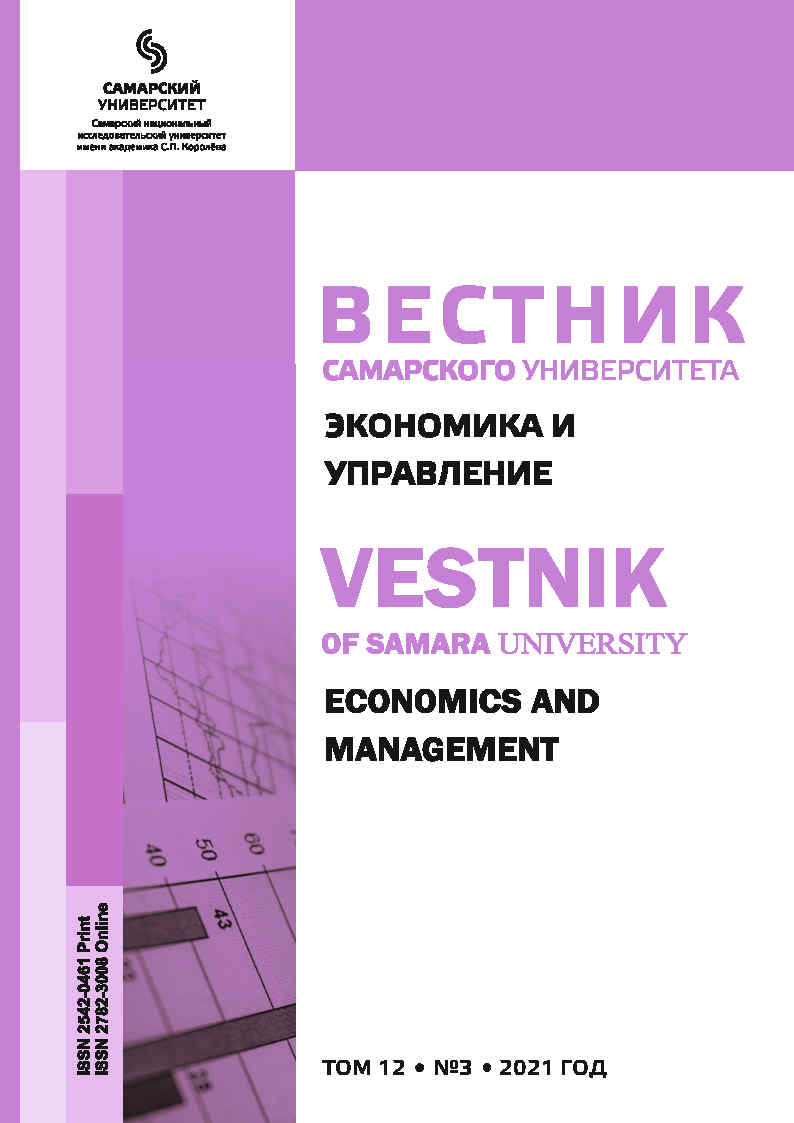Choosing effective solutions in conflict situations taking into account the interests of stakeholders
- Authors: Yurlov F.F.1, Yashin S.N.2, Plekhanova A.F.2
-
Affiliations:
- Nizhny Novgorod State Technical University n.a. R.E. Alekseev
- National Research Lobachevsky State University of Nizhny Novgorod
- Issue: Vol 12, No 3 (2021)
- Pages: 137-146
- Section: MANAGEMENT
- URL: https://journals.ssau.ru/eco/article/view/9872
- DOI: https://doi.org/10.18287/2542-0461-2021-12-3-137-146
- ID: 9872
Cite item
Full Text
Abstract
When choosing effective tactical and strategic decisions by business entities, it is necessary to take into account the interests of stakeholders. From the point of view of increasing competitiveness, the main importance should be given to competitors, as the most important external stakeholders. Competitors have directly opposite interests to the analyzed economic entities and have a negative impact on their activities, therefore, conflict situations arise. In this paper, we propose a method for selecting effective solutions, taking into account the interests of competitors as the most important stakeholders. The proposed methodology can be used in the analysis of systems for various purposes and includes the formation of the goals of the analyzed object, the identification and selection of competitors and the formulation of strategies of the parties to the conflict. The efficiency matrix is formed using the efficiency functions and the antagonism condition of the analyzed objects. The choice of effective solutions is made by choosing the principle of optimality. A special feature of the proposed methodology is the complex application of theories: competition theory, stakeholder theory, and antagonistic game theory. The proposed methodology can be used to evaluate the effectiveness of systems for various purposes: industrial enterprises, commercial organizations, investment projects, research organizations, etc.
About the authors
Felix F. Yurlov
Nizhny Novgorod State Technical University n.a. R.E. Alekseev
Author for correspondence.
Email: ffyurlov@gmail.com
honored scientist of the Russian Federation, academician of the Russian Academy of Natural Sciences, Doctor of Technical Sciences, professor of the Department of Digital Economy
Russian Federation, 24, Minina Street, Nizhny NovgorodSergey N. Yashin
National Research Lobachevsky State University of Nizhny Novgorod
Email: jashin@iee.unn.ru
Academician of the Russian Academy of Natural Sciences, professor of the Department of Management and Public Administration
Russian Federation, 23, Gagarin Avenue, Nizhny NovgorodAnna F. Plekhanova
National Research Lobachevsky State University of Nizhny Novgorod
Email: docplekhanova@gmail.com
Academician of the Russian Academy of Natural Sciences, professor of the Department of Finance and Credit
Russian Federation, 23, Gagarin Avenue, Nizhny NovgorodReferences
- Friedman A., Miles S. Stakeholders: Theory and Practice. Oxford: Oxford University Press, 2006, 360 р.
- Tyurina A.I. Mechanism of company' stakeholder management. ECONOMY AND BUSINESS: theory and practice, 2020, no. 5-3 (63), pp. 229–234. DOI: https://doi.org/10.24411/2411-0450-2020-10515. (In Russ.)
- Plekhanova A.N., Yurlov F.F. Choosing effective solutions in the economy, taking into account the interests of stakeholders. Collection of works of the scientific school of the Honored Scientist of the Russian Federation, Academician of the Russian Academy of Natural Sciences, Doctor of Technical Sciences, Professor F.F. Yurlov. Nizhny Novgorod: Izd-vo NGTU, 2019, pp. 76–85. Available at: https://www.elibrary.ru/item.asp?id=42651047&pff=1. (In Russ.)
- Samoylova E.S. The relationship of stakeholders with the competitive advantages of the organization. Innovation Science, 2016, no. 3-1, pp. 202–204. Available at: https://www.elibrary.ru/item.asp?id=25684029. (In Russ.)
- Markitanov M.Yu. On the need to clarify the concept of conflict situations in the economy. Topical issues of economics, management and education: materials of the Russian research and practical conference. Nizhny Novgorod: Izd-vo NGTU, 2011. (In Russ.)
- Neumann John von, Morgenshtern O. Game theory and economic behavior. Translation from English under the editorship and with additions by Vorobyev N.N. Moscow: Nauka, 1970, 707 p. Available at: https://institutiones.com/download/books/806-teoriya-igr-economichescoe-povedenie.html. (In Russ.)
- Yanovskaya E.B. Antagonistic games. In the collection: Problems of cybernetics. Moscow, 1978, issue 34, pp. 221–246. (In Russ.)
- Bonenblast Kh., Karlin S. On one of Will's theorems. In the collection: Endless antagonistic games.
- Moscow: Fizmatlit, 1963, pp. 489–496. (In Russ.)
- Voitishek Ya.V., Galileev M.M., Chernov V.P., Chernautsanu T.V. Methods of optimal solutions (antagonistic games): textbook. Saint Petersburg: Izd-vo SPbGEU, 2018, 74 p. Available at: https://www.elibrary.ru/item.asp?id=36951913. (In Russ.)
- Sinchukov A.V. Antagonistic games in the neoclassical setting: research and didactic aspects. Innovative technologies in machine building, education and the economy, 2018, vol. 17, no. 2 (8), pp. 25–30. Available at: https://www.elibrary.ru/item.asp?id=36289253. (In Russ.)
- Berge K. General multi-person game theory. Moscow: Fizmatlit, 1961. Available at: https://booksee.org/book/578716. (In Russ.)
Supplementary files










